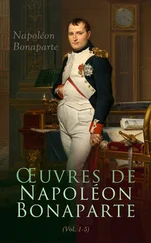Bonaparte took great pleasure in our performances. He liked to see plays acted by persons with whom he was familiar. Sometimes he complimented us on our exertions. Although I was as much amused with the thing as others, I was more than once obliged to remind him that my occupations left me but little time to learn my parts. Then he would assume his coaxing manner and say, "Come, do not vex me! You have such a memory! You know that it amuses me. You see that these performances render Malmaison gay and animated; Josephine takes much pleasure in them. Rise earlier in the morning.—In fact, I sleep too much; is not that the cafe—Come, Bourrienne, do oblige me. You make me laugh so heartily! Do not deprive me of this pleasure. I have not over much amusement, as you well know."—"All, truly! I would not deprive you of any pleasure. I am delighted to be able to contribute to your amusement." After a conversation of this sort I could not do less than set about studying my part.
At this period, during summer, I had half the Sunday to myself. I was, however, obliged to devote a portion of this precious leisure to pleasing Bonaparte by studying a new part as a surprise for him. Occasionally, however, I passed the time at Ruel. I recollect that one day, when I had hurried there from Malmaison, I lost a beautiful watch made by Breguet. It was four o'clock in the afternoon, and the road was that day thronged with people. I made my loss publicly known by means of the crier of Ruel. An hour after, as I was sitting down to table, a young lad belonging to the village brought me my watch. He had found it on the high road in a wheel rut. I was pleased with the probity of this young man, and rewarded both him and his father, who accompanied him. I reiterated the circumstance the same evening to the First Consul, who was so struck with this instance of honesty that he directed me to procure information respecting the young man and his family. I learned that they were honest peasants. Bonaparte gave employment to three brothers of this family; and, what was most difficult to persuade him to, he exempted the young man who brought me the watch from the conscription.
When a fact of this nature reached Bonaparte's ear it was seldom that he did not give the principal actor in it some proof of his satisfaction. Two qualities predominated in his character—kindness and impatience. Impatience, when he was under its influence, got the better of him; it was then impossible for him to control himself. I had a remarkable proof of it about this very period.
Canova having arrived in Paris came to St. Cloud to model the figure of the First Consul, of whom he was about to make a colossal statue. This great artist came often, in the hope of getting his model to stand in the proper attitude; but Bonaparte was so tired, disgusted, and fretted by the process, that he very seldom put himself in the required attitude, and then only for a short time. Bonaparte notwithstanding had the highest regard for Canova. Whenever he was announced the First Consul sent me to keep him company until he was at leisure to give him a sitting; but he would shrug up his shoulders and say, "More modeling! Good Heavens, how vexatious!" Canova expressed great displeasure at not being able to study his model as he wished to do, and the little anxiety of Bonaparte on the subject damped the ardour of his imagination. Everybody agrees in saying that he has not succeeded in the work, and I have explained the reason. The Duke of Wellington afterwards possessed this colossal statue, which was about twice his own height.
1802.
Bonaparte's principle as to the change of Ministers—Fouche—His influence with the First Consul—Fouche's dismissal—The departments of Police and Justice united under Regnier—Madame Bonaparte's regret for the dismissal of Fouche—Family scenes—Madame Louis Bonaparte's pregnancy—False and infamous reports to Josephine— Legitimacy and a bastard—Raederer reproached by Josephine—Her visit to Ruel—Long conversation with her—Assertion at St. Helena respecting a great political fraud.
It is a principle particularly applicable to absolute governments that a prince should change his ministers as seldom as possible, and never except upon serious grounds. Bonaparte acted on this principle when First Consul, and also when he became Emperor. He often allowed unjust causes to influence him, but he never dismissed a Minister without cause; indeed, he more than once, without any reason, retained Ministers longer than he ought to have done in the situations in which he had placed them. Bonaparte's tenacity in this respect, in some instances, produced very opposite results. For instance, it afforded M. Gaudin' time to establish a degree of order in the administration of Finance which before his time had never existed; and on the other hand, it enabled M. Decres to reduce the Ministry of Marine to an unparalleled state of confusion.
Конец ознакомительного фрагмента.
Текст предоставлен ООО «ЛитРес».
Прочитайте эту книгу целиком, купив полную легальную версию на ЛитРес.
Безопасно оплатить книгу можно банковской картой Visa, MasterCard, Maestro, со счета мобильного телефона, с платежного терминала, в салоне МТС или Связной, через PayPal, WebMoney, Яндекс.Деньги, QIWI Кошелек, бонусными картами или другим удобным Вам способом.












